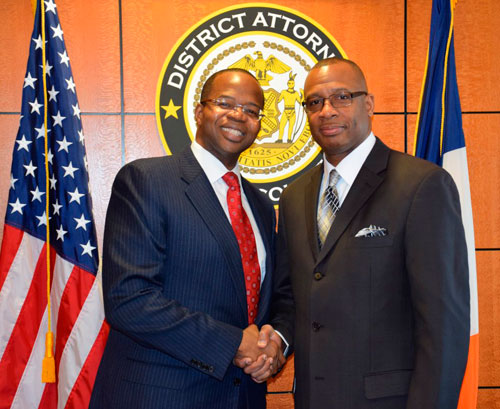Brooklyn’s top prosecutor has had a judge throw out the 1986 burglary conviction of an immigrant facing deportation.
The exoneration of Michael Waithe for a crime prosecutors now say “never happened” is the first following District Attorney Ken Thompson’s Wednesday announcement that he is expanding the scope of his office’s review of questionable convictions to include serious non-murder felonies such as gun possession and burglary.
“We’ve been dealing with the priority cases, the ones that were in prison for murder, but now we have to start looking at these other cases,” Thompson said after a speech at a meeting of the New York State Bar Association in Manhattan.
Waithe spent a year and a half in prison after Dolores Taylor, a tenant in the Prospect Lefferts Gardens apartment building where he worked as a security guard, falsely accused him of burglary, according to the authorities. Taylor had blamed him when her car disappeared, prosecutors said. Unable to pin the vanished car on him, she reported her television stolen and told cops that she had witnessed Waithe and two other men grabbing the set from her home. It later emerged Taylor’s uncle had taken her car, according to the legal eagles. Prosecutors convicted Waithe on felony burglary charges for the TV theft, sending him to prison for nearly two years on Taylor’s testimony alone, the District Attorney’s Office said.
Waithe, now an organizer with a union for healthcare workers, kept his nose clean after his release from prison, and the felony conviction faded into a bad memory until 2011, when upon returning from a trip to his native Barbados, immigration officials informed him he was being processed for deportation due to his record. He found out about the Conviction Review Unit last fall, and when he contacted Thompson’s office the unit chose his case as its first non-homicide review case, in part because Waithe’s ability to remain in the country was in imminent danger.
Waithe said he was driving to work when he found out that Thompson would be asking a judge to toss out his conviction, and he said he had to pull over as he broke down in tears of joy.
“I had faith from day one,” he said moments after a Brooklyn Supreme Court judge affirmed his innocence. “I just said, ‘Thank you God, thank you God, thank you God.’ ”
Despite spending time in prison and facing deportation thanks to the lies Taylor told, Waithe said he has no anger toward her.
“I’m too overwhelmed with joy right now,” he said. “She has her own cross to bear.”
Thompson’s expanded review includes “a handful” of non-homicide cases on top of the 130 cases selected for review, of which 100 remain. Thompson’s office has tossed 11 convictions to date.
Thompson unseated former District Attorney Charles Hynes in 2013, ending Hynes’s 23 years in office. Hynes’s retirement has been bumpy so far. He now faces allegations that he paid a political consultant more than $1.1 million in public funds from 2003 to 2013, including $220,000 in cash seized from criminals.
The city probe that documented the charges also revealed e-mails between Hynes and New York City chief judge Barry Kamins showing the judge consulted with Hynes on Hynes’s campaign and on cases being prosecuted by the District Attorney’s Office, and that he gave Hynes legal advice. The revelations prompted Kamins to resign.
Waithe was convicted under Hynes’s predecessor Elizabeth Holtzman.
Thompson’s Conviction Review Unit is made up of 10 prosecutors whose job consists of re-investigating cases where there is reasonable suspicion that a claim of wrongful conviction is genuine. The task force began its review in 2014, with 71 of its cases involving convictions built on evidence, confessions, or witness testimony brought by an allegedly crooked detective, Louis Scarcella.
Thompson said none of the non-murder cases under review are linked to Scarcella.
Thompson’s next most recent exoneration was that of Derrick Hamilton, who was convicted of a fatal shooting in 1991 even though he had strong proof he was in Connecticut at the time. Hamilton was released in 2011, but his felony conviction had hung over his head until Thompson asked a judge to toss it.
In a speech to members of the bar association on Wednesday, Thompson said he set out to clean out bad convictions as a service to innocent people behind bars and to restore faith in law enforcement in Brooklyn.
“If you have any doubt that people are starting to lose faith in or system of justice, all you have to do is look at the tens of thousands of people who have been marching and protesting in the past couple of months throughout the country from Oakland to Brooklyn,” he said. “Those calls reflect that public trust is going down, and we have to do something about it.”























